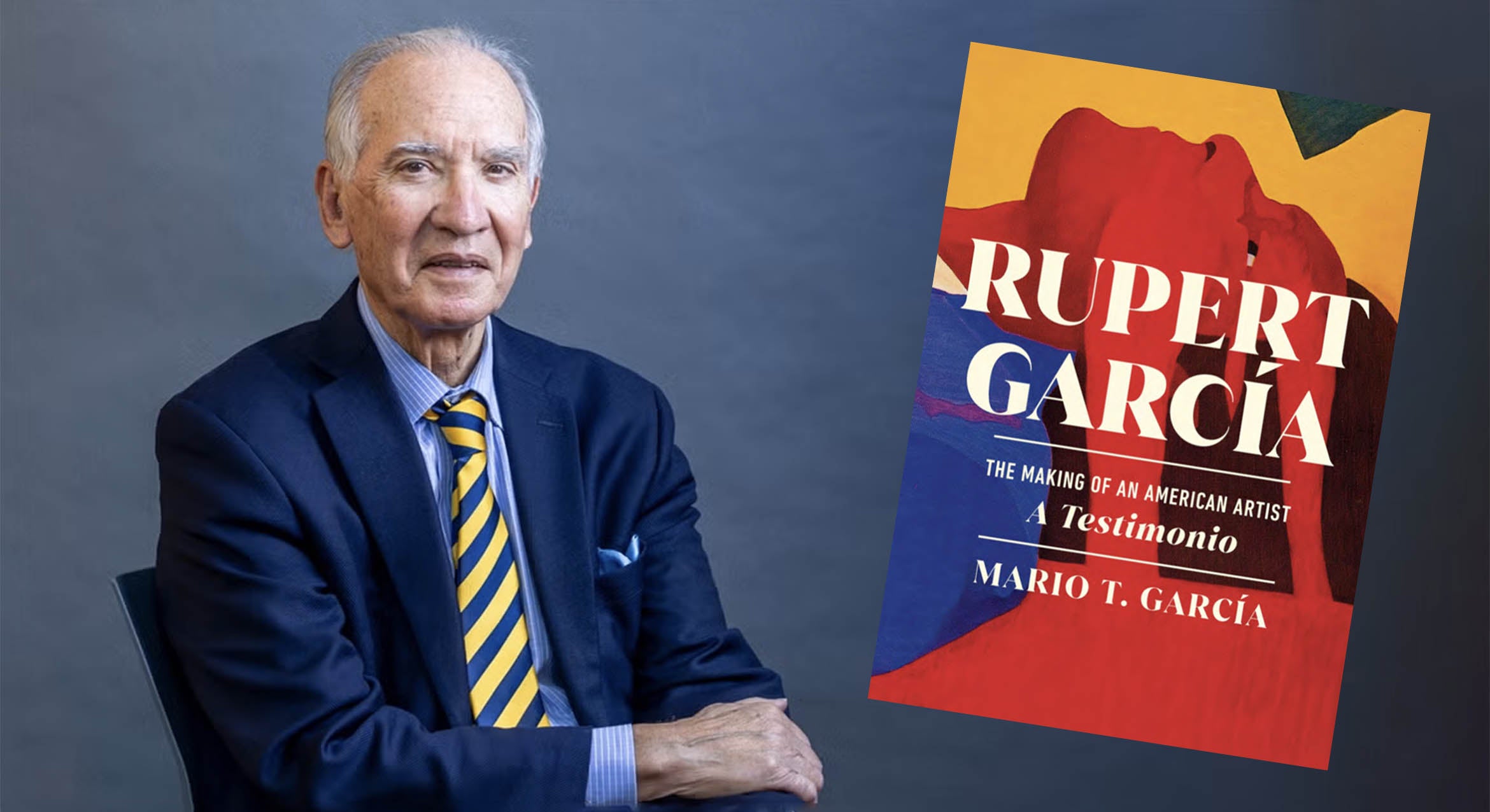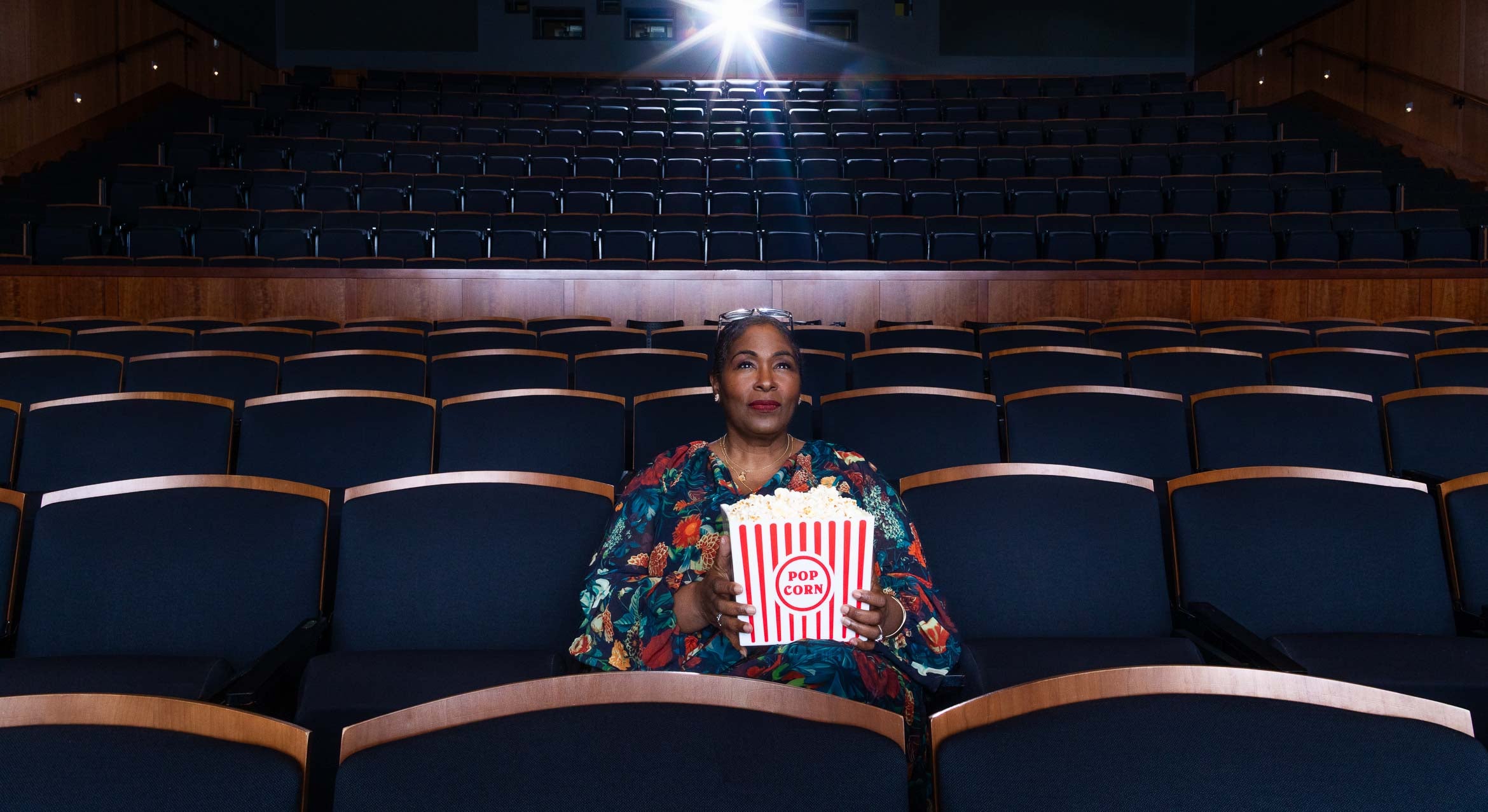
‘Spontaneous Overflow’
In the preface to his “Lyrical Ballads,” William Wordsworth described all good poetry as “the spontaneous overflow of powerful feeling.” April is National Poetry Month, and to celebrate this auspicious literary occasion The Current is highlighting some of the campus’s resident wordsmiths.
Throughout the month, we have published pieces by faculty and staff poets whose work has been recognized nationally and internationally.
We conclude today with two poems by Sojourner Kincaid Rolle, community coordinator for the Center for Black Studies Research.
Here are the poets we’ve already highlighted: George Yatchisin, Rick Benjamin, George HS Singer, Yunte Huang, Shirley Geok-lin Lim, Swati Rana, Robert Krut, John Ridland, Stephanie Batiste and Teddy Macker.
The Mockingbird's Song
A Song of the Singers’ Singer
Remembering Clyde Woods
It was after the flags had been lowered -
We lifted our heads to watch
this insistent warbler
marveling at his timely retinue;
a rigorous rendition
involving runs
and several turns in the air.
and then he was silent
against the voluminous sky
He dipped down as if to bow
and then,
displaying the smooth white feathers
beneath his wings,
He gently soared away
Leaving us in awe-struck
contemplation and proud.
We, friends, colleagues, protégés -
we all loved him after a manner.
For the moment, we would survey
his gifts to us — personal and everlasting.
Random encounters in the ivied corridors,
fortunate and precise moments
in the tome-packed cubicles -
very few places to sit,
precious little space to talk.
We would also consider his innumerable
contributions to the academy
and to the community of us all.
A certain numbness blunted
any thoughts of depth or profundity.
We were a flock in sorrow.
Our swollen eyes and streaked faces
spoke what our tongues could not broach.
Our aimless wander from arm to arm
to touch or embrace or kiss -
to share that sad and soulful knowing.
We each had lost an irreplaceable friend.
Each of us carried our own piece of his soul.
Each of us knew a part of his song.
He was a singer's singer
able to pull the lyrics from our muted hearts
and show us how our own self could sound.
He was a blues man
He had seen the Blues people
the gathering of poor people
the pain on their faces
the substance of their existence
and traveled into the heart of their pain
ascertaining and deconstructing their songs
singing them back in mellow tones
even the heartless could hear.
He was a soul man of unordinary coolness -
born on the Mason-Dixon line;
bred in the East, refined in the West,
he navigated the cultural plains
claiming his own territory
singing his song of songs.
He was a man of letters with a common man’s sense
could listen to the illest rhymes on the street
then run them down with a philosopher’s beat
He was a man
who cared about the least of us
and we, we who learned his song
now sing our parts. We are the singers.
Across the plains; across the terrain,
across the diaspora, we sing his song - our song.
We Have Come To Now
(For the Women’s Center on its 40th Anniversary)
The Then The Now The When
The Me The You The We
The What The Why The How The Will
The Bruised The Battered
The Disillusioned The Disenchanted
The Solitude The Struggle The Silence
The Talk The Listen The Trust The Share
The Fear, The Pain, The Secrets The Shame
A Closet A Nest A Lounge A Home
The Open Door The Sages The Wisdom
Mothers Mentors Sisters Lovers
“Our Bodies, Our Selves”
The Strengthening
The Emboldening
The Standing Strong
“A Room To Call Our Own”
Our Own Stories Our Own Images Our Own Songs
Our Poets Our Authors Our Womanist Articulators
A Base A Foundation A Platform
“Our Own Piece of Ground”
The Visionaries The Leaders The Enablers
The Survivors The Overcomers The Thrivers
Our Unbound Feet Our Unbridled Breasts
Our Untangled Tongues Our Unfettered Feminism
Our Uncontained Joy
The Remembering The Experiencing
The Imagining
The Causes The Initiatives The Gained Ground
The Garnered Concessions The Continuous Strive
We Claim Our Right
“We Take Back the Night”
The Sanctuary The Refuge
The Ever-present Light in Trouble
A Leg A Hand An Arm A Bridge
To There From Here To There
Our Higher Hopes
Our Wilder Dreams
Our Greater Aspirations
To Live To Express To Choose To Love
“And Still [We] Rise”
— Sojourner Kincaid Rolle
George Yatchisin
Against Personification
An asylum is just
an empty room
with the right kind of people in it.
But then so’s a classroom
so I’ll forgive
this one its tiny size
and the students’ sighs,
large as an asteroid
out hunting dinosaurs.
If it’s mean of me
to make them eke out
their poetry in pencil lead
I’ll be that sumbitch,
be the cruel and human Cenozoic
slamming into the Mesozoic
like a glacier shaving
conifers to razor stubble.
I’ll never get over
being surprised their youth
still offers flits of wisdom,
lines they don’t know enough
to die for. It couldn’t
have been a happy first
fish to sprout legs, mount
land, gasp at the inexcusable air
of a wondrous new world.
— George Yatchisin, communications coordinator, Gevirtz Graduate School of Education
Rick Benjamin
To My Doppelgänger
You sit on the curb without knowing what
you are going to do while I start climbing
a tree toward a nest I will never actually
find. You, you’re of a mind to follow
directions, rules, to be dutiful before
authority. I disobey, routinely fail to
read instructions, walk away when
someone else tells me what to do.
We’re both walking the same road,
that’s true, without having any idea
of where we are headed. You ask
each person you meet for directions,
anxious for answers, while I enjoy
getting lost, forget where I meant
to travel, land in someone’s kitchen
drinking tea. You have grown tired
of me, always leading you to another
path you’d rather not have followed,
while I’m still trying to please you.
After all, we come from one nest.
— Rick Benjamin, adjunct professor of comparative literature and of environmental studies
George HS Singer
Well Met, the Light
Every second, all hours, lifelong
Like a bat on the wing the mind chirrs and pings
even wanting to want-- desperate to locate
itself with itself. And so for these groceries: Praise.
No need to instruct-- my arms know their craft,
hefting the cabbage and apples in the grocery bag
lugging the jug of milk as it sloshes. Ambling too—
long bones hinge and unhinge at the knee,
muscles clench and release in synchrony,
unthought though each step is a fall.
Breath needs not ask to enter and leave
the way children come and go freely in and out
the doors of a kindly home for years.
And light too is well met. Eyes apprehend
the sun as it tessellates through the scud
and spindrift on the Sound—no need to ask how.
The know-how lodges deep in the brain stem,
the neural webs that intend blink, swallow, and breath.
They flare and craft walk, they pulse and form see, they
link their billion nodes and conjure this sense of a me.
— George HS Singer, professor in the Gevirtz Graduate School of Education
Yunte Huang
To Be An Asian Poet
To be or not to be
That’s out of the question
Between Asia and America
I choose the life of a poet
Between English and Chinese
I prefer the authenticity of translationese
Between black and white
I have no choice but be yellow
Between truth and lie
I would rather get high
Between real and unreal
Well, it depends how I feel
I’m a Chinese poet on Angel Island
A Japanese poet in internment camps
A Filipino poet in sugarcane plantations
A Korean poet in LA riots
An FOB poet on Boeing 747
A Transcontinental poet on World Wide Web
A restaurateur poet in Alabama
A Language poet in Buffalo
A coolie poet at Harvard Yard
An academic poet in Santa Barbara
A funny poet in my kids’ schoolyard
A chicken poet in the year of the Dog
When they ask me
What kind of ‘nese are you
Chinese, Japanese, or Vietnamese?
I ask them
What kind of ‘keys are you
Yankee, donkey, or monkey?
I singsong
When they ask me to sing a song
I tango
When they call me Tang O
I write a locu
When they ask for a haiku
I write poems for fortune cookies
Where they expect to read
“A Great fortune is awaiting you!”
“You are a talented person”
Or “You are so beautiful!”
I put in “Watch out!”
“We know what you did last summer”
Or “April is the cruelest month”
Where they want to find
Their superlotto numbers
I write in the amount they will lose
To be or not to be
That’s out of the question
Between Asia and America
I choose the life of a poet
Between English and Chinese
I prefer the taste of translationese
Between black and white
I want to be a rainbow
Between truth and lie
I can usually get by
Between the real and unreal
I prefer the impossible
— Yunte Huang, professor of English
Shirley Geok-lin Lim
Learning to Love America
because it has no pure products
because the Pacific Ocean sweeps along the coastline
because the water of the ocean is cold
and because land is better than ocean
because I say we rather than they
because I live in California
I have eaten fresh artichokes
and jacaranda bloom in April and May
because my senses have caught up with my body
my breath with the air it swallows
my hunger with my mouth
because I walk barefoot in my house
because I have nursed my son at my breast
because he is a strong American boy
because I have seen his eyes redden when he is asked who he is
because he answers I don’t know
because to have a son is to have a country
because my son will bury me here
because countries are in our blood and we bleed them
because it is late and too late to change my mind
because it is time.
— Shirley Geok-lin Lim, professor emerita of English
Swati Rana
Plane Ride After 9/11
Sash is half
down to block the sun
coming out instead
of its reflection
in the ocean.
Waves are still
moving minutely
like sand. A boat
blemishes hills
of water, more boldly
shaded by the drag
of clouds. Where ocean
ends and sky
begins, can’t say,
a heavy ledge
then lighter grey
retreating. Clouds mount
the horizon, soundless,
aroused by a wide
mad expanse.
The coast intrudes,
casts an edge,
but the sun
is driving
up the mouth
of an estuary.
This is where we begin
to exist
upon the fetid
soil, its long
cultivated skin,
the effort
of order exerted
on a landscape.
A furious shine passes
over lakes, ponds,
metal siding.
The plane slants aside
till the earth’s face
meets mine,
horizon climbs up
then down again through
clouds, cavernous
breath. Spit out,
we break from land
traces, abridged
sky. The hot cabin
is like waking
from a restless
night, window
closed too tight—
Suddenly
I see another plane
fly in the opposite
direction, occult
mirror of the sky
briefly revealed
to contain
our own precarious
situation. I see myself
peering
from below a half
downed sash,
brown skin,
a kind of
terror.
—Swati Rana, assistant professor of English
Robert Krut
Divinity
Virus-blind, you stumble to an alley,
under a lentil rainstorm, a preacher
waves rudder arms to the thunder,
makes lightning scatter until five canaries
escape his sleeves, singing condolences,
a misdirection from the transistor radio
around his neck, beneath his vestments,
its zealous torque fusing electrodes
to your breath, turning thoughts to words,
your face a cannon, and the realization
that he was merely a collection of discarded
nightclub flyers lifted by wind
between graffitied walls.
— Robert Krut, lecturer, UCSB Writing Program
John Ridland
To the Brave Generation
Who have been fired on, and march now for their lives
Those who should lead this land of the free and the brave,
Who should have led you, must now themselves be led
By you who learned too early what it is to give
A life, or rather, to have it taken away
For no good reason except that it was there
For the gun and the shooter who could shoot anywhere,
Who had no image of what it means to live,
Moved by a spirit angry as it was dead.
You learned how easily night can shadow day
By pulling a switch, a trigger. You survive,
You have been tested by fire, and chosen to save
Our nation from itself: you'll be The Brave
Generation, and the Free, who can keep us alive.
— John Ridland, professor emeritus of English
Stephanie Leigh Batiste
Fray
Loops remain.
Remnant of the tangled thread
Memory restored to the past,
the present
threads forth across the knot
Restored towards prismatic being.
Losing One
Losing one’s mother
is like losing your root.
being unattached
to the world
to history
yesterday now and the day before are doubtful
perhaps not having been at all
tomorrow
a wall of static
beyond it
a tear that might swallow
and you wonder
perhaps
is it possible
no longer to belong
to this planet.
Is it even still
spinning...
— Stephanie Leigh Batiste, associate professor of Black studies and of English
Teddy Macker
The Otter and the Seaweed
This is what you need to know:
you need to know that otters wrap themselves
in seaweed so they won’t,
while sleeping at night, float out to sea…
Are you imagining this?
Can you see the otters actually doing this?
Does it break your heart a little?
Does it seduce you just a bit
into loving more
this odd hard world?
Oh otters, wrap yourselves tight! And sleep,
exactly like you do, floating but seaweed-held
in our salty living waters! Oh otters,
wrap yourselves tight! And you,
the one who doesn’t, the one who doesn’t
tether himself down right,
we are with you as you float away,
we are with you as you sleep
and lose yourself in the night.
On This Earth
after a line by Mahmoud Darwish
We have on this earth what makes life worth living:
the perfume of a sleeping child, the four rain-colored wings
of the dragonfly, the hourglass on the black widow’s belly
pouring blood into blood. We have the mineral green innards
of cucumber, rain-pocked snow, the plastic crucifix
on the sick whore’s wall, sincerer than any cathedral.
We have an alley of poplar trees and road-darkened feet,
bats sipping clear water from a dwindling creek,
we have slices of black bread at a blue table by the sea.
We have on this earth what makes life worth living,
what makes it so queer and lovely and painful,
moon on the snake in the dying rosemary,
and the young couple upstairs in bed
undressing each other regardless.
— Teddy Macker, lecturer, College of Creative Studies



